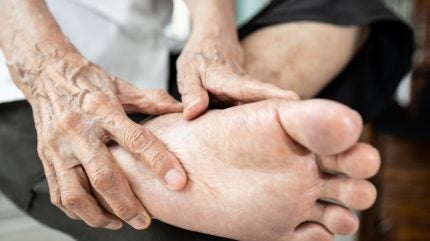
Microbion has reported positive topline results from its Phase II study of pravibismane, a topical treatment for diabetic foot ulcer infections (DFI).
The multi-centre, controlled, randomised, exploratory, open-label trial involved 46 subjects and met its primary objective by demonstrating a favourable safety and tolerability profile over a 12-week treatment period, followed by a four-week follow-up, with no adverse events linked to the therapy.

Discover B2B Marketing That Performs
Combine business intelligence and editorial excellence to reach engaged professionals across 36 leading media platforms.
Subjects with moderately infected chronic diabetic foot ulcers (DFU) were randomised at approximately a 2:1 ratio to receive either the topical pravibismane plus standard of care (SoC) or SoC alone.
The pravibismane group showed favourable trends in wound closure and reduction in wound size compared to SoC alone, although the study was not powered for statistical efficacy.
In addition to the positive safety outcomes over the 12-week treatment and four-week follow-up period, pharmacokinetic data indicated no trace of systemic exposure or accumulation of pravibismane.
The treatment had no visible impacts on vital signs, haematology, clinical chemistry, electrocardiogram (ECG) parameters, or other lab findings.

US Tariffs are shifting - will you react or anticipate?
Don’t let policy changes catch you off guard. Stay proactive with real-time data and expert analysis.
By GlobalDataThe trial is also said to have re-confirmed the therapy’s potency against a broad spectrum of drug-resistant bacterial isolates from subjects.
All infections treated comprised multiple bacterial species, with key pathogens in diabetic foot ulcers, including antibiotic-resistant strains, were sensitive to this topical treatment.
The secondary objectives of the study included exploring signals of efficacy seen in previous clinical trials and assessing the operational feasibility of at-home administration of the topical medication.
Microbion president and chief innovation officer Dr Brett Baker said: “We demonstrated the safety and feasibility of a much longer duration regimen and a higher drug concentration with over half of the treatments being self-administered by patients at home.
“The clinical efficacy signals further confirm topical pravibismane’s potential for achieving complete wound closure in chronic, long-standing wounds that are otherwise not responding to the current standard of care.
“Topical pravibismane has now consistently been shown to be safe and well-tolerated in six clinical studies involving over 350 human subjects.”
The trial was funded partially by award from Naval Medical Research Command (NMRC) – Naval Advanced Medical Development (NAMD) through the Medical Technology Enterprise Consortium (MTEC) under Other Transactions Authority (OTA) Number W81XWH-15-9-0001.





